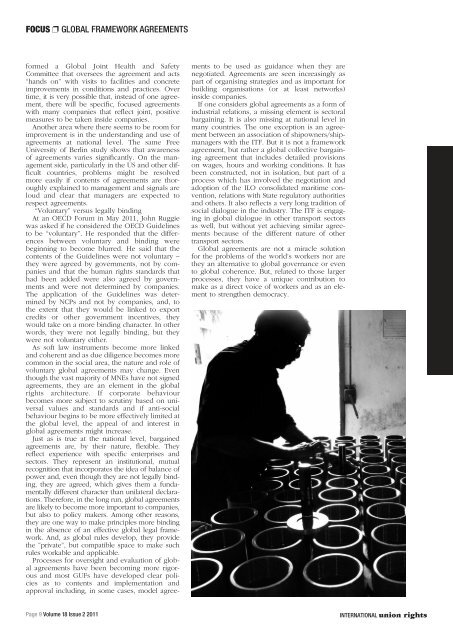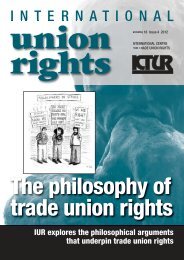FOCUS ❐ GLOBAL FRAMEWORK AGREEMENTSAs soft lawinstrumentsbecome morelinked andcoherent and asdue diligencebecomes morecommon in thesocial area, thenature and role ofvoluntary globalagreements maychangecounterparts would be “<strong>for</strong>eign” interference inUS affairs.US companies, on the other hand, have had nosimilar compunction about interference whenthey have opposed positive changes in labourlaw elsewhere in the world, including in suchplaces as China, Georgia, and Romania.On due diligence, the Ruggie GuidingPrinciples state, “In order to identify, prevent andmitigate adverse human rights impacts, and toaccount <strong>for</strong> their per<strong>for</strong>mance, business enterprisesshould carry out human rights due diligence.The process should include assessing actual andpotential human rights impacts, integrating andacting upon the findings, and tracking as well ascommunicating their per<strong>for</strong>mance”. Often, whenthere is good communication between a companyand a GUF, the GUF provides an independentsource of in<strong>for</strong>mation about what is happeninginside the company and, to some extent, withbusiness partners. If the relationship functionswell, it can be an important contributor to carryingout due diligence.“Remedy” applies to state and non-state actorswhen there are abuses. It includes grievancemechanisms. <strong>Global</strong> agreements are, in fact,largely used to resolve problems and com<strong>for</strong>tablyfit into the Ruggie <strong>Framework</strong>.However, <strong>Global</strong> Union representatives, in aconsultation with John Ruggie in October of 2010and in a written submission at the end of Januaryof 2011 warned that phony grievance procedures<strong>for</strong> employees could be abused and used toundermine trade unions. The text of the commentaryof the Guiding Principles that refers to thisproblem states, “Operational-level grievance mechanismsshould not be used to undermine the role oflegitimate trade unions in addressing labor-relateddisputes, or to preclude access to judicial or nonjudicialgrievance mechanisms”. Business organisationsargued against that provision, but itremained, unchanged, in the text as submitted tothe Human Rights Council on 31 May 2011.The Ruggie <strong>Framework</strong> was used as a basis ofthe new Human Rights chapter of the 2011update of the OECD Guidelines <strong>for</strong> MultinationalEnterprises and it shaped the <strong>for</strong>mulation of newprovisions on due diligence and the applicationof the Guidelines to business partners. Theupdated Guidelines also adapted and incorporatedRuggie’s principles <strong>for</strong> the effective operationof a non-judicial grievance mechanism into therules governing the operation of National ContactPoints (NCOs). During the same period, ISO26000 on CSR was finalised and new standards<strong>for</strong> the <strong>International</strong> Finance Corporation of theWorld Bank were developed. Both took on boardthe <strong>Framework</strong>. A number of global agreementsinclude references to the OECD Guidelines.Some state that they are considered to be part ofthe agreements, so the changes may serve tobroaden the scope of such agreements as well.One of the frontiers of global agreements is thequestion of business partners, in other words,how to apply the agreement to enterprises thatper<strong>for</strong>m work <strong>for</strong> the MNE. There are a fewagreements that have specific references to businesspartners and some references to the employmentrelationship or to “precarious work”.Discussions on this matter are, however, takingplace with a number of companies. The recentagreement with GDF SUEZ (Dec. 2010) includesone of the most far-reaching clauses, as follows:“GDF SUEZ recognizes the importance of secureemployment <strong>for</strong> both the individual and <strong>for</strong> societythrough a preference <strong>for</strong> permanent, open-endedand direct employment. GDF SUEZ and all subcontractorsshall take full responsibility <strong>for</strong> allwork being per<strong>for</strong>med under the appropriate legalframework and, in particular, shall not seek toavoid obligations of the employer to dependentworkers by disguising what would otherwise be anemployment relationship or through the excessiveuse of temporary or agency labour... Companieswill ensure that workers are not classified as selfemployedwhen working under conditions ofdirect employment (bogus self-employment). GDFSUEZ expects its partners to apply comparableprinciples and regards this to be an importantbasis <strong>for</strong> a lasting business relationship”.CSR and <strong>Global</strong> <strong>Agreements</strong>A study that is being carried out by the FreeUniversity of Berlin on global agreements indicatesthat GUFs tend to see them as being part ofindustrial relations and that signatory companiestend to consider them as part of corporate socialresponsibility. That is also beginning to changeand the Ruggie <strong>Framework</strong> is relevant in this areaas well. Respecting rights as an obligation linksmore closely with industrial relations than it doeswith making a “business case” <strong>for</strong> doing the rightthing. An industrial relations approach is alsomore realistic and pragmatic.CSR is about reputational risk and has roots inpublic relations. It is about proving virtue. <strong>Global</strong>agreements, at least as understood by tradeunions, have their roots in industrial relations.The assumption at the global level, as at nationallevel, is that conflicts and problems will arise.The purpose of the agreements is neither toprove or deny virtue nor to enhance or jeopardisereputations. It is simply to ensure that rightsare protected and that an orderly process isdeveloped to resolve conflict. The real world ofthe workplace can never be an unending seriesof “win-win” situations. It is rather a process ofvigilance, problem solving and, at times, positivejoint action. <strong>Global</strong> agreements are a <strong>for</strong>m ofglobal union recognition that provides commonprinciples and mechanisms that can be applied toreal life situations.As employer attitudes on the nature of globalagreements change, they will begin to shed theremnants of CSR mentality. <strong>Agreements</strong> will nolonger be considered something that can be heldup like codes of conduct or sustainability reportsto ward off public reproach in the same way thata cross and garlic might keep Dracula away. Onecan already see some companies beginning torealise the value of the relationship with GUFsand of agreements. There is some evolutiontowards positive action and co-operation.That was already a feature of the originalDanone (then BSN) agreements with the IUF thatwere focused both on rights and on improving thecompany in ways that were beneficial to workers.The ArcelorMital agreement with the IMF focuseson occupational health and safety. They haveINTERNATIONAL union rights Page 8 Volume 18 Issue 2 2011
FOCUS ❐ GLOBAL FRAMEWORK AGREEMENTS<strong>for</strong>med a <strong>Global</strong> Joint Health and SafetyCommittee that oversees the agreement and acts“hands on” with visits to facilities and concreteimprovements in conditions and practices. Overtime, it is very possible that, instead of one agreement,there will be specific, focused agreementswith many companies that reflect joint, positivemeasures to be taken inside companies.Another area where there seems to be room <strong>for</strong>improvement is in the understanding and use ofagreements at national level. The same FreeUniversity of Berlin study shows that awarenessof agreements varies significantly. On the managementside, particularly in the US and other difficultcountries, problems might be resolvedmore easily if contents of agreements are thoroughlyexplained to management and signals areloud and clear that managers are expected torespect agreements.“Voluntary” versus legally bindingAt an OECD Forum in May 2011, John Ruggiewas asked if he considered the OECD Guidelinesto be “voluntary”. He responded that the differencesbetween voluntary and binding werebeginning to become blurred. He said that thecontents of the Guidelines were not voluntary –they were agreed by governments, not by companiesand that the human rights standards thathad been added were also agreed by governmentsand were not determined by companies.The application of the Guidelines was determinedby NCPs and not by companies, and, tothe extent that they would be linked to exportcredits or other government incentives, theywould take on a more binding character. In otherwords, they were not legally binding, but theywere not voluntary either.As soft law instruments become more linkedand coherent and as due diligence becomes morecommon in the social area, the nature and role ofvoluntary global agreements may change. Eventhough the vast majority of MNEs have not signedagreements, they are an element in the globalrights architecture. If corporate behaviourbecomes more subject to scrutiny based on universalvalues and standards and if anti-socialbehaviour begins to be more effectively limited atthe global level, the appeal of and interest inglobal agreements might increase.Just as is true at the national level, bargainedagreements are, by their nature, flexible. Theyreflect experience with specific enterprises andsectors. They represent an institutional, mutualrecognition that incorporates the idea of balance ofpower and, even though they are not legally binding,they are agreed, which gives them a fundamentallydifferent character than unilateral declarations.There<strong>for</strong>e, in the long run, global agreementsare likely to become more important to companies,but also to policy makers. Among other reasons,they are one way to make principles more bindingin the absence of an effective global legal framework.And, as global rules develop, they providethe “private”, but compatible space to make suchrules workable and applicable.Processes <strong>for</strong> oversight and evaluation of globalagreements have been becoming more rigorousand most GUFs have developed clear policiesas to contents and implementation andapproval including, in some cases, model agreementsto be used as guidance when they arenegotiated. <strong>Agreements</strong> are seen increasingly aspart of organising strategies and as important <strong>for</strong>building organisations (or at least networks)inside companies.If one considers global agreements as a <strong>for</strong>m ofindustrial relations, a missing element is sectoralbargaining. It is also missing at national level inmany countries. The one exception is an agreementbetween an association of shipowners/shipmanagerswith the ITF. But it is not a frameworkagreement, but rather a global collective bargainingagreement that includes detailed provisionson wages, hours and working conditions. It hasbeen constructed, not in isolation, but part of aprocess which has involved the negotiation andadoption of the ILO consolidated maritime convention,relations with State regulatory authoritiesand others. It also reflects a very long tradition ofsocial dialogue in the industry. The ITF is engagingin global dialogue in other transport sectorsas well, but without yet achieving similar agreementsbecause of the different nature of othertransport sectors.<strong>Global</strong> agreements are not a miracle solution<strong>for</strong> the problems of the world’s workers nor arethey an alternative to global governance or evento global coherence. But, related to those largerprocesses, they have a unique contribution tomake as a direct voice of workers and as an elementto strengthen democracy.Page 9 Volume 18 Issue 2 2011INTERNATIONAL union rights





